Carried by Faith: Black Voices of The Salvation Army
by Hugo Bravo
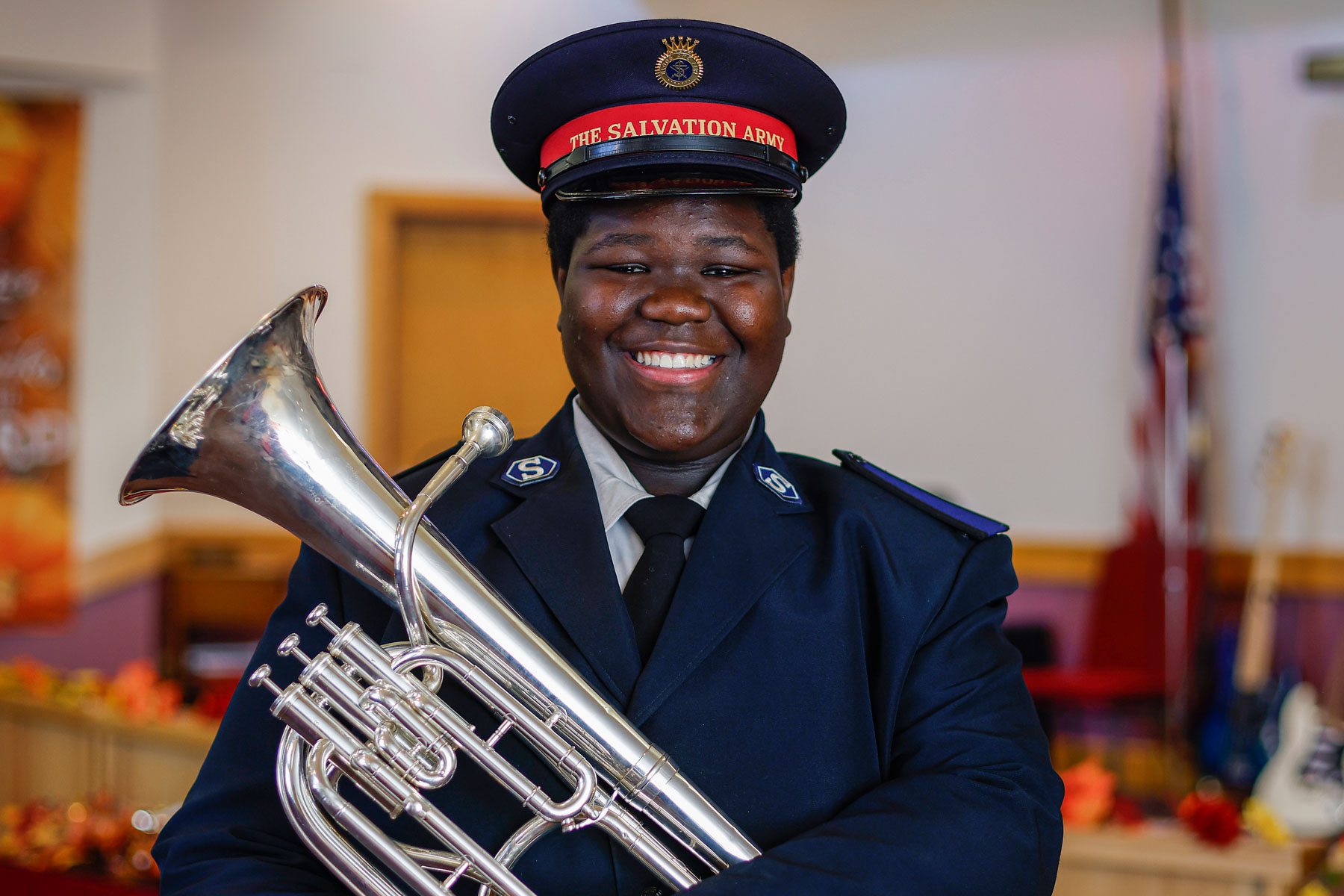
In many communities, the local church serves as a cornerstone of cultural and spiritual life. For Black members, it’s also a space of resilience, identity, and empowerment. These interviews with African American Salvation Army officers, employees, and supporters highlight their contributions and ministries, while also recognizing some challenges they’ve faced. We acknowledge them by sharing their testimonies with you. We celebrate the integral role they each play in the mission. Most of all, we honor them for their work in honoring the mission of The Salvation Army every day.
Eight-year-old Tyonn Leonard, pictured above, didn’t know what The Salvation Army was the day that he walked into the West Philadelphia Corps Community Center.
“I didn’t comprehend what the Army did,” says Leonard, now 16. “I came on Sundays but didn’t understand the lessons being taught, or the sense of community here.”
But that community would keep Leonard coming back. Raised by a single mother, Leonard remembers her struggle to find a place to live. They often found themselves having to sleep on relatives’ couches and floors until they were able to finally buy a home in West Philadelphia.
“At a very young age, I was on the streets a lot,” says Leonard. “To go from that to where I am now, it can only happen through the Lord’s blessings.”
“In the years I’ve known Tyonn, he has shown incredible maturity and growth within himself and in his walk with Christ,” says Lieutenant Bassey Archibong, who has been at the West Philadelphia Corps for almost three years. “From being involved in Sunday services to taking over responsibilities in the corps, he’s gone so far beyond the role of a junior soldier. Having him here is a pleasure and a blessing for us as well.”
“I try to be involved in everything I can,” says Leonard. “I like to volunteer and help at the corps, but my favorite thing about The Salvation Army is the music program. Playing music is like starting a lifelong career. There is always more for me to learn.”
Being so involved at the corps behind the scenes has given Leonard a unique perspective on what it means to serve the community.
“After high school, I want to go to college,” says Leonard. “But I also see a path for becoming even more involved in The Salvation Army. I want to welcome others like they welcomed me.”
photo credit: Michael Paras Photography
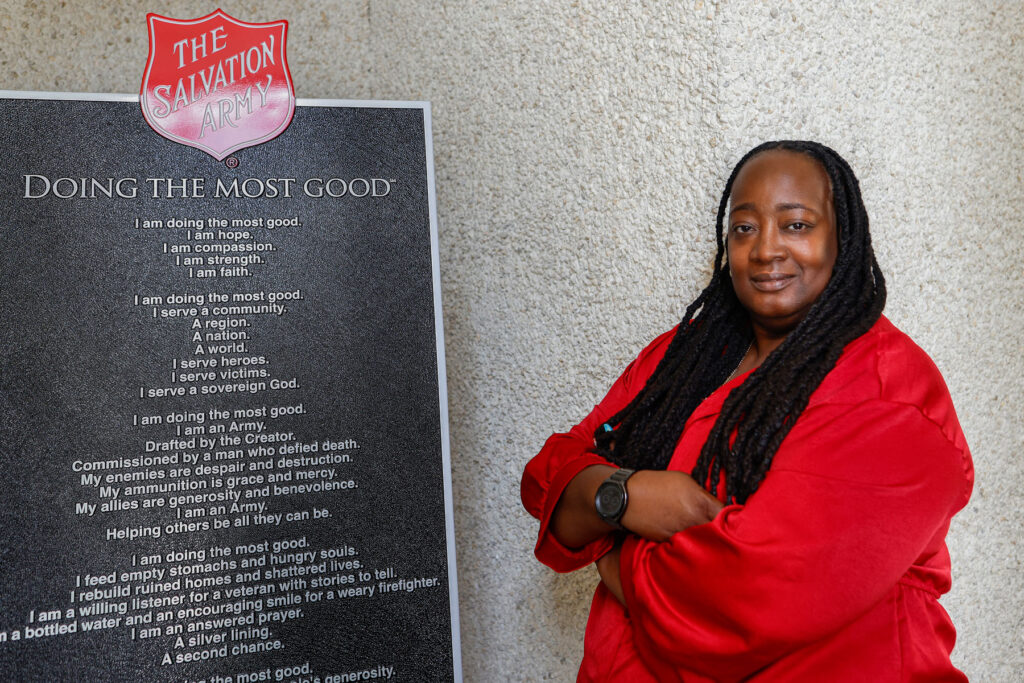
“I saw one of the boys I used to mentor at a bus stop with his friends,” says Kali Lewis, pictured above. “When I called out to him, he looked around and immediately stood up straight and fixed his pants. He had aged out of our programs years ago, but when he saw me, he ran to me and gave me a hug.”
KALI LEWIS
Kali Lewis is an ordained Baptist preacher, a teacher, and the education specialist for The Salvation Army New Jersey Divisional Headquarters in Union, N.J.
Working with children has always given Kali Lewis a sense of purpose, whether it was at a day care center for a summer job or as teen group leader at an after-school program.
“Many of the inner-city kids in the program came from trauma-informed backgrounds. Some didn’t even live with their parents,” says Lewis. “When I mentored these young people, my goal was to show them there were things in their own lives that they could look forward to.”
While studying for her master’s degree in divinity at New Brunswick Theological Seminary, Lewis also worked as a substitute teacher. This flexible schedule allowed her to maintain focus on her classes. “As a substitute, I would study the material and go over it with the class. Even when their regular teacher isn’t present, schoolchildren need structure,” she says. “I suddenly found myself with many long-term substitute gigs.”
After graduating, Lewis prayed for a job where she could use her education and experience in a way that would honor the Lord. “I needed to work where Jesus was,” says Lewis, now the education specialist for The Salvation Army in New Jersey. She helps education directors for corps in the state to thrive in their communities.
“We created quality educational programs for the children of the ministry that engaged the parents as well. Those parents were the ones who were getting the word out for us by telling other families to come to The Salvation Army,” says Lewis. “In cities like New Brunswick, we have a lot of Hispanic families. Some of them speak English, and others don’t. But love is a universal language, and they all found a home here with us.
“Ministry is present in everything The Salvation Army does, including education. There is a component of faith, hope, and the love of Christ that runs through our work. You can feel it the moment you walk in to any program.”
photo credit: Michael Paras Photography
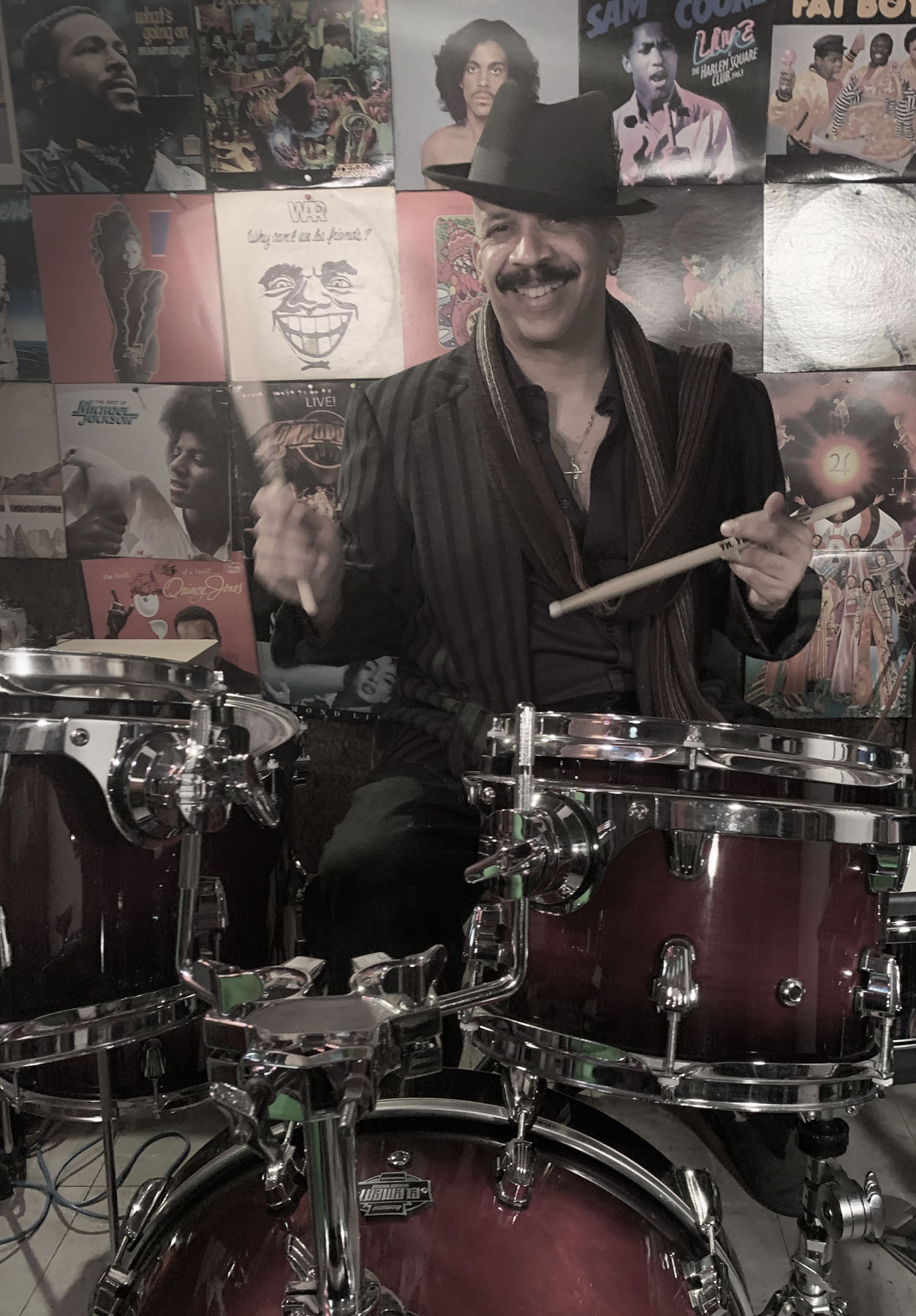
“Philadelphia made me a better musician,” says Bill Jolly. “Philly fans are tough, so if you want to be loved for what you do here, you better be good at it. When you go to places like New York or Los Angeles, they know if you’re from Philly, you’ve worked and hustled hard to get where you are.”
BILL JOLLY
Bill Jolly, a member of The Salvation Army Ray & Joan Kroc Corps Community Center in Philadelphia, is a three-time Emmy Award–winning composer, arranger, musical director, and keyboardist.
Decades before sharing the stage with musical legends like Stevie Wonder, Aretha Franklin, and Teddy Pendergrass, or doing musical tributes to Isaac Hayes and Donny Hathaway, Bill Jolly sat in church, watching his father, Elton Jolly, sing for the congregation.
“My father was a gospel singer who knew the Bible inside and out. I didn’t always understand what was being taught in church, but I understood clearly how people reacted to his singing,” says Jolly.
Bill Jolly’s first band in high school got a much different response. There were constant disagreements between him and his bandmates, and he remembers audiences booing their performances.
“Even the name of our band, Albatross, was an issue. We thought it meant a beautiful, graceful bird. But it also means a problem that hangs around your neck. So I guess the name was appropriate,” says Jolly, laughing. “Looking back on the whole journey from beginning to now, I’m grateful to God for every difficult time in my life.”
When the band’s soundman quit, young Bill immediately had to learn how to do the soundman’s job to keep the shows going. When their keyboard player left, Jolly, who was already the band’s drummer, taught himself to play piano.
“I told myself I was never going to be without a piano player ever again,” he says.
Later in life, a car accident forced Jolly to take time off from his thriving musical career, something he’d avoided doing. But while recovering, he started a habit that he continues to this day, 35 years later.
“Every January, I make lists of everything I want to accomplish in the next 365 days, and of what I’ve done in the past 365 days that I thought could be done better,” says Jolly. “Then I look at last year’s list, and cross off everything I accomplished. This forces me to be better every year.”
Last February, The Salvation Army Ray & Joan Kroc Corps Community Center in Philadelphia held “Shining a Light on Black History,” celebrating individuals who have made an impact on the city’s arts and culture. As one of the honorees, Jolly listened as his achievements were read to the audience: composing music for world-renowned brands such as HBO and McDonald’s, performing for five U.S. presidents, and most recently, receiving two platinum records for his work with pop superstar Pink.
“People in the music business like to say that you could climb Mount Everest, and the first thing you’ll be asked when you come down will be, ‘So, what’s next?’” says Jolly. “But it’s important to pause and remember everything that you have done, and what it has meant to you. If you get too hung up on what’s next, or feel like you’re not doing anything unless you’re busy doing something, you might forget who you really are.
“You can take a moment to say, ‘I could’ve done this better’ or ‘I didn’t get to do that,’ but after that, pat yourself on the back and say ‘But look! Here’s everything good I did.’”
photo courtesy by Bill Jolly
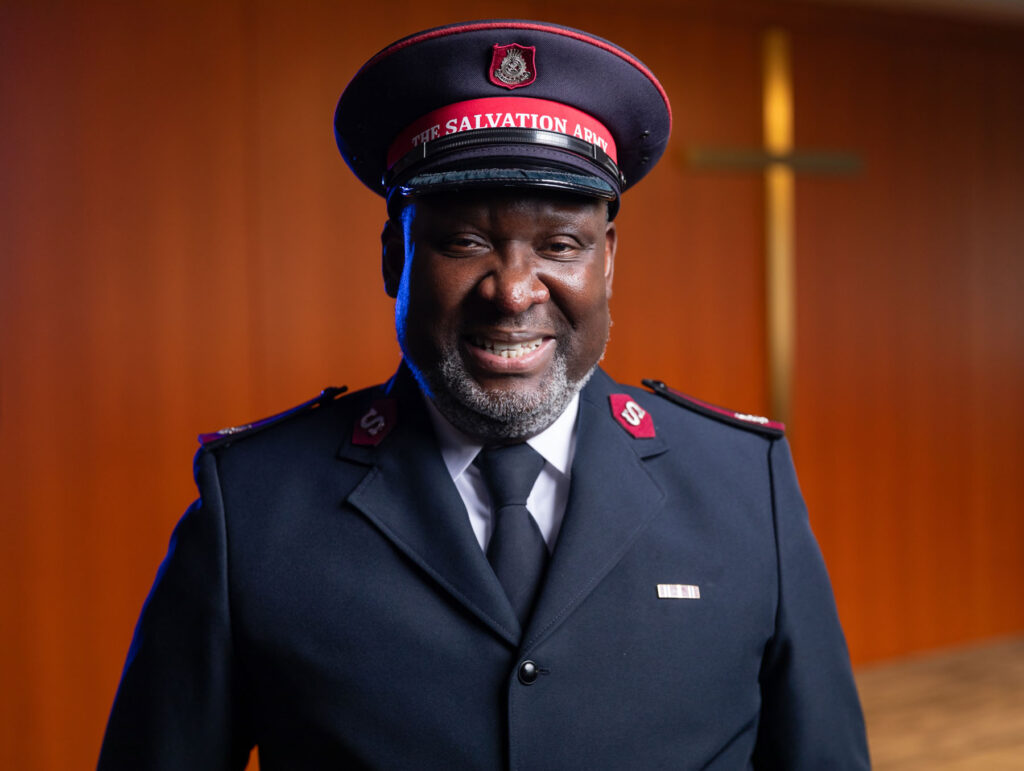
Words of Comfort “Today, there are people scared and discouraged for all sorts of reasons,” says Major Elijah Kahn. “We need to be alongside those individuals, always ready to serve them with joy and show what we can do for them as Salvationists.”
MAJOR ELIJAH KAHN
Major Elijah Kahn serves as the general secretary and Kroc liaison officer of The Salvation Army Massachusetts Division.
If our time on earth were measured as a sports match, Major Elijah Kahn would say that he is now in the third quarter.
“If I could go back and meet myself during my first quarter, to that young man searching for meaning in life, I would say this: Find Jesus as soon as you can, and serve Him,” says Kahn. “The trajectory of your life will change for the better when you come to know Christ as your Lord and Savior.”
Kahn’s first experience with The Salvation Army was in his home corps of Brooklyn, N.Y., where his younger siblings attended the Brownsville Salvation Army’s after-school day care program. He met the corps officers, then-Captains Raphael and Sandra Jackson (now lieutenant colonels), who nurtured Kahn’s own faith and interest in the church.
“The Salvation Army’s model of ministry was both vertical and horizontal: vertical to symbolize our relationship with God above, and horizontal for the people coming together to worship,” says Kahn. “When I spoke to Captain Raphael Jackson about the possibility of one day becoming an officer, he replied that he knew of no better place to serve God than The Salvation Army.”
In the second quarter of his life, while training to be a Salvation Army officer, Kahn met Cadet Valerie Satterlee, who’d become his wife and partner in ministry. Kahn says he and his family have continuously leaned on their faith in the Lord. But he also acknowledges that as an African American serving in God’s Army, there are figures to whom he owes gratitude for paving the way.
“Salvationists of African heritage must not forget that we stand on the shoulders of those who have come before us. Their sacrifices, perseverance, and tenacity helped shape us today,” says Kahn.
“We now have a responsibility to pass along what we have learned. Hebrews 12 says that we are surrounded by a great cloud of witnesses. That cloud is those who have done the work before us, invested in us, and continue to cheer us on.
“As long as we never get complacent in our faith, journey, service and roles, God will never be done with us. That’s why I’m looking forward with great anticipation to the fourth quarter of my life.”
photo credit: Matthew Luhn

“My mother, Delilah ‘Dee’ Collier, was a member of the Black Ministries Committee of The Salvation Army back in the ’60s and ’70s,” says Envoy Pat Wood. “In 2002, she was awarded the Order of the Founder, the Salvation Army’s highest honor. She worked hard to create a path forward for girls like me in the Army. I can look back on her work and be reminded that as difficult as it was for me, it doesn’t compare to some of the struggles she faced.”
ENVOY PAT WOOD
Envoy Pat Wood serves in retirement as the divisional lay leadership development coordinator for the Southern New England Division.
Pat Wood considers herself a “trifecta” within The Salvation Army: a Black woman envoy.
“To some, that can seem like being at the bottom of a totem pole,” she says. “But I’ve been fortunate to find myself in places where the leadership I brought was accepted.”
Not that there weren’t challenges. Wood says it can sometimes be difficult for more traditional churches to suddenly accept a woman in a position of power. Even among some Army leaders, there was occasionally a sense that they weren’t sure where a Black female pastor fit within their ministries.
“But there was also a shift to openness in admitting these personal feelings and taking steps to address them. It began by listening to all of our experiences. What were the challenges, fears, or discomforts for each of us?”
Wood has had opportunities to address the Army on her experiences as that “trifecta,” and to have conversations that, though difficult at times, have helped people open their minds and see what we all have in common.
“There are so many young people of color as cadets or lieutenants in their first assignment. They are lucky to be coming into the Army today,” says Wood. “And I’m excited! Not only for them, but for the feeling of validation for what we have done in The Salvation Army.
“Many of us thought that maybe nothing would change, and that no one was listening to us. But that was incorrect. The hard work and the difficult conversations were not in vain. We spoke out, and we were heard.”
photo credit: Lu Lu Rivera
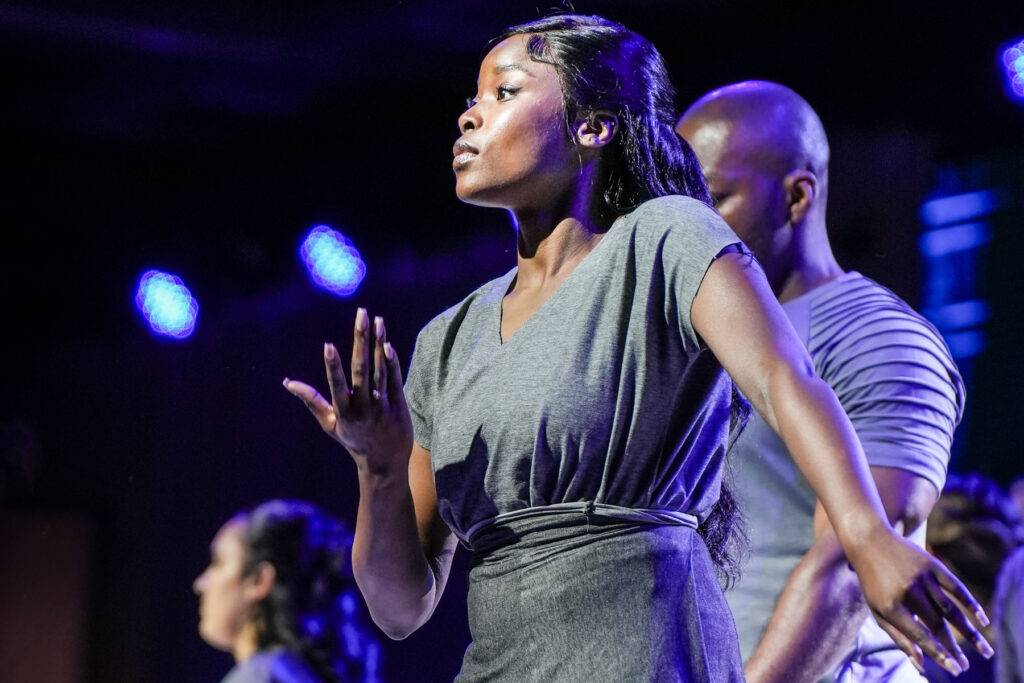
“Dance is an unspoken language and can reach God,” says Nya Speller. “Some people reach Him with their voices. Some do it by teaching the Bible to others. Dancers do it with our bodies and movements.”
NYA SPELLER
Nya Speller is the divisional creative arts director for The Salvation Army Empire State Division in Syracuse, N.Y.
Nya Speller was 5 years old when her family was invited to the Salvation Army corps in Kingston, N.Y. There, she discovered one of the Army’s oldest traditions: its music and arts ministry. The programs, Speller says, kept her engaged. But though she was an experienced hip-hop dancer, it was her twin sister, Mya, who was accepted into the Army’s dance groups.
“I still went to all Mya’s rehearsals to support,” says Speller, who is now creative arts director for The Salvation Army Empire State Division. “I’m grateful that God put me in a role where I connect with people who love dance too, because now I can give back what I’ve learned. I always tell dance students that you can go be a dancer anywhere on the planet, but when you dance for the Army, your dancing is an act of worship.”
Since Speller began attending in the mid-2000s, the Kingston Corps—and many other Salvation Army churches in Greater New York and across the Eastern Territory—has experienced a demographic shift. Speller remembers being able to count the Black members on one hand.
“The worship and songs were done in a traditional way, but I didn’t mind. My family had to move away for five years, and when we came back, I saw a different side,” she says. “I visited corps made up of Caribbean Salvationists who celebrated the festival of harvest with timbrels, singing and waving flags. It was alive, expressive, and so different than what I’d seen growing up. Our church honors the cultures of the people who attend it, and makes those cultures part of the corps. The Army started as a predominantly white church, but there’s been beautiful growth and change in its ministry and congregation. Just like the kingdom of God, we are all welcome.”
photo credit: Lu Lu Rivera

“Timbrels have helped our boys grow spiritually,” says Major Cynthia Foster. “If they’re ever nervous, they pray for calm. If they think they’ve forgotten what they’ve learned, they pray for help remembering. They know that in every practice and performance, God is with them.”
MAJOR CYNTHIA FOSTER
Major Cynthia Foster is the corps officer of The Salvation Army Syracuse Citadel Corps in Syracuse, N.Y.
In 2024, an all-male team from The Salvation Army in Syracuse won second place in the Timbrel Brigade competition at Star Search, the Army’s annual talent showcase. Their timbrel leader, Major Cynthia Foster, recalls how this group of young Black soldiers first started as a motivation squad for the corps’ female timbrel team.
“These boys were already part of our singing company, but as training for Star Search began, I brought up the idea of them having a timbrel team too,” says Foster. “They were interested but felt that the girls were so much more ahead. I said, ‘You may just be beginners, but you could still be great beginners.’”
Foster, a self-described Star Search enthusiast, has always been deeply involved in The Salvation Army’s arts ministries. She finds joy in bringing young people together for new experiences and sharing her passion for this type of ministry.
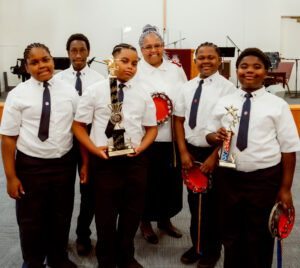
“Our corps has children who have been attending since they were little, and some that just started coming over the last few years. I call those my ‘COVID babies,’” says Foster. “They’ve been introduced to the Army through our community outreach, and they all come together for our music and dance programs.”
Timbrel, says Foster, is what’s closest to her heart. Her love and appreciation for this staple of Salvation Army history shines through in her work with Syracuse’s all-male timbrel team. Together, they rehearse in preparation for next year’s Star Search and carefully review every critique and suggestion they’ve received.
“Children love what you love if you love them too,” she says. “People always like to talk about what you can and cannot get boys to do. They say they won’t want to participate or that it’s not for them. But why think that way? Timbrel has become something they enjoy.
“We can call it sticking to our traditions, but I just call it loving our young people and giving them an opportunity to express themselves.”
photo credit: Emily Kae Photography

